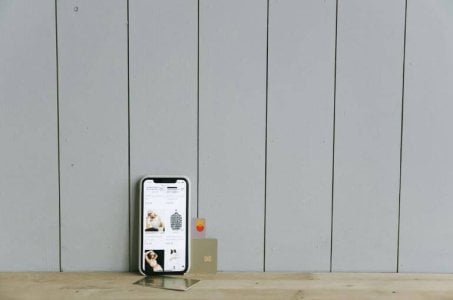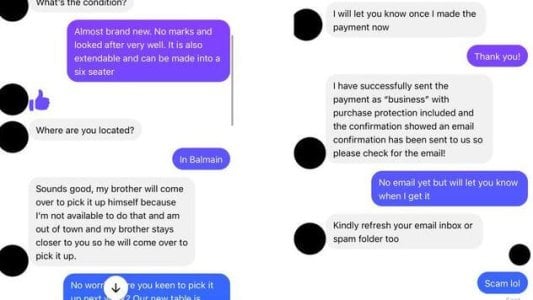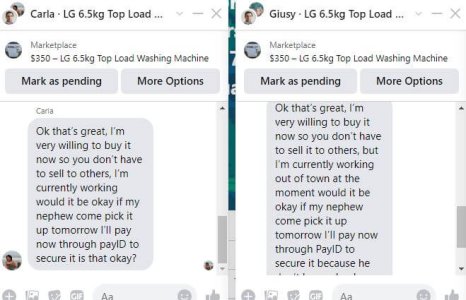Alert: Australians are losing their savings to this fast-spreading social media scam – are you at risk?
- Replies 7
As the world gets increasingly dependent on digital processes, the number of cyber criminals looking to target vulnerable Australians also increases.
Now authorities are warning of a scam that is targeting people who are trying to make some extra cash by selling unwanted or used items online.
Facebook Marketplace is one of the most popular social media platforms where people can buy and sell items. However, as convenient as this is, it’s also become a breeding ground for cybercriminals looking to con unsuspecting victims.
A new PayID impersonation is the latest scam targeting sellers on the platform and various other online marketplace websites as well.
According to reports, scammers respond to online ads and pose as prospective buyers. Then, they’ll offer to pay using PayID, and trick sellers into transferring cash to activate or upgrade their accounts.
Amber, a victim of the PayID scam, said she was advertising a second-hand bed online when a ‘buyer’ contacted her. To Amber, the scammer seemed like a legitimate buyer.
‘I kept thinking I’ve gone through Commonwealth Bank to set it up, it should be safe,’ she told reporters.
Before she knew it, she had lost $500.
Previous reports about this type of scam have circulated all over the internet. One woman who wanted to offload her old dining table on Facebook Marketplace was bombarded with messages from ‘potential buyers’ after listing her old furniture for sale.
‘As anyone with experience selling an item on the platform will tell you, you'll be utterly bombarded with dozens of “Is this still available?” messages thanks to Facebook's automatic message generator,’ she told reporters.
Thanks to her quick thinking, the woman figured out that the first person she interacted with was a scammer. The full details, including how the woman spotted the red flags in their conversation, can be read here.
In the social media forum Reddit, one user noticed they were receiving similar messages from ‘buyers’ in Facebook Marketplace as well. The Reddit user noted how these customers wanted to pay through PayID and said they couldn’t pick up the items themselves, but a ‘nephew’ would come instead.
According to Scamwatch, Australians lost $260,000 to PayID impersonation scams in 2022.
A spokesperson from NAB stated that the scam is targeting Aussies looking to increase ‘side hustles’ or add to their income to deal with the rising cost of living.
Chris Sheehan, from NAB’s executive group of investigations and fraud, said that the true number of PayID scams affecting the country was expected to be higher given that many remain unreported.
New research also showed that 53 per cent of Aussies are holding on to some $1,500 worth of unwanted goods. However, more than 25 per cent of people are deterred from selling their items because of inconvenience and the unwillingness to deal with social media hassles.
‘No one wants to try to sell their old couch, fridge, phone or pram and it inadvertently ends up costing them,’ Mr Sheehan shared.
‘Unfortunately, that’s what’s happening more and more when people try to sell items online.’
He added that since online marketplaces have replaced garage sales as the go-to option for selling second-hand goods, the way people receive or send payments is also constantly evolving.
Additionally, scammers may be using PayID because it is (relatively) new technology that many aren’t familiar with.
‘Cyber criminals are sophisticated and we’re unfortunately now seeing them try to exploit PayID given, on the whole, it isn’t as familiar to the community as other ways to send and receive money,’ he claimed.
Mr Sheehan warned that the biggest red flag of any PayID-related scam is if someone asks for money to upgrade an account or to access PayID. ‘There are never any charges related to using PayID,’ he continued.
He also reminded everyone that PayID will never:
‘We will always make every attempt to prevent scams and recover funds where possible, but it can be very difficult to recover them once the funds have left a victim’s account,’ Mr Sheehan explained.

Stay safe, members! Remember, if you or someone you know has fallen victim to a scam, raise the issue to the authorities immediately and report it to Scamwatch here.
Do you buy or sell items online? Have you encountered similar experiences? Share them with us in the comments below!
Now authorities are warning of a scam that is targeting people who are trying to make some extra cash by selling unwanted or used items online.
Facebook Marketplace is one of the most popular social media platforms where people can buy and sell items. However, as convenient as this is, it’s also become a breeding ground for cybercriminals looking to con unsuspecting victims.
A new PayID impersonation is the latest scam targeting sellers on the platform and various other online marketplace websites as well.
According to reports, scammers respond to online ads and pose as prospective buyers. Then, they’ll offer to pay using PayID, and trick sellers into transferring cash to activate or upgrade their accounts.
Amber, a victim of the PayID scam, said she was advertising a second-hand bed online when a ‘buyer’ contacted her. To Amber, the scammer seemed like a legitimate buyer.
‘I kept thinking I’ve gone through Commonwealth Bank to set it up, it should be safe,’ she told reporters.
Before she knew it, she had lost $500.
Previous reports about this type of scam have circulated all over the internet. One woman who wanted to offload her old dining table on Facebook Marketplace was bombarded with messages from ‘potential buyers’ after listing her old furniture for sale.
‘As anyone with experience selling an item on the platform will tell you, you'll be utterly bombarded with dozens of “Is this still available?” messages thanks to Facebook's automatic message generator,’ she told reporters.
Thanks to her quick thinking, the woman figured out that the first person she interacted with was a scammer. The full details, including how the woman spotted the red flags in their conversation, can be read here.
In the social media forum Reddit, one user noticed they were receiving similar messages from ‘buyers’ in Facebook Marketplace as well. The Reddit user noted how these customers wanted to pay through PayID and said they couldn’t pick up the items themselves, but a ‘nephew’ would come instead.
According to Scamwatch, Australians lost $260,000 to PayID impersonation scams in 2022.
A spokesperson from NAB stated that the scam is targeting Aussies looking to increase ‘side hustles’ or add to their income to deal with the rising cost of living.
Chris Sheehan, from NAB’s executive group of investigations and fraud, said that the true number of PayID scams affecting the country was expected to be higher given that many remain unreported.
New research also showed that 53 per cent of Aussies are holding on to some $1,500 worth of unwanted goods. However, more than 25 per cent of people are deterred from selling their items because of inconvenience and the unwillingness to deal with social media hassles.
‘No one wants to try to sell their old couch, fridge, phone or pram and it inadvertently ends up costing them,’ Mr Sheehan shared.
‘Unfortunately, that’s what’s happening more and more when people try to sell items online.’
He added that since online marketplaces have replaced garage sales as the go-to option for selling second-hand goods, the way people receive or send payments is also constantly evolving.
Additionally, scammers may be using PayID because it is (relatively) new technology that many aren’t familiar with.
‘Cyber criminals are sophisticated and we’re unfortunately now seeing them try to exploit PayID given, on the whole, it isn’t as familiar to the community as other ways to send and receive money,’ he claimed.
Mr Sheehan warned that the biggest red flag of any PayID-related scam is if someone asks for money to upgrade an account or to access PayID. ‘There are never any charges related to using PayID,’ he continued.
He also reminded everyone that PayID will never:
- Ask you to send money to receive a payment via PayID
- Take any additional action like upgrading your account or paying additional fees before money can be received into your bank account.
- Send or receive communication directly from PayID via email, text, or messenger. PayID is managed by your bank.
‘We will always make every attempt to prevent scams and recover funds where possible, but it can be very difficult to recover them once the funds have left a victim’s account,’ Mr Sheehan explained.
Key Takeaways
- Australians selling items online are being warned to watch out for a new PayID impersonation scam.
- The scammers deceive sellers into transferring cash to activate or upgrade their account.
- More than $260,000 was lost to PayID impersonation scams last year, according to Scamwatch.
- Scammers are using PayID as it is a new technology many Australians may not yet be familiar with.
Do you buy or sell items online? Have you encountered similar experiences? Share them with us in the comments below!











